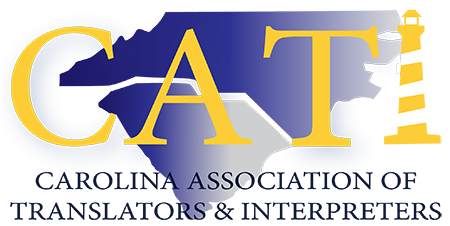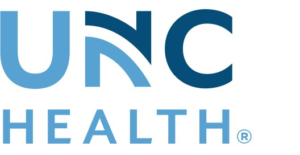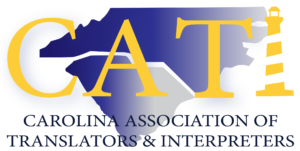
36th Annual Conference
of the Carolina Association of Translators and Interpreters
“Working Globally, Networking Locally”
Hosted by UNC Charlotte, Charlotte, NC
May 4, 2024
CATI CONFERENCE SCHEDULE OF EVENTS
8:00-8:45 am /Lucas Room / Breakfast – Sign in
8:45-9:00 am / Lucas Room / Welcome– Maria Rodriguez, CATI President
9:00-10:15 am / Lucas Room / Keynote: “Irreplaceable Interpreters: How Stepping Up and Standing Out Can Help Us Stay Relevant in Our
Fast-Changing Industry” by Andrea Henry, CHI-Spanish – I – ATA, CCHI, NCAOC, IMIA
10:15-11:00 am / Lucas Room / Coffee Break – Networking Breakout Session
Concurrent Session I / 11:00 am – 12:00 pm
1A / Lucas Room / “Inclusive and Non-binary Language, Pragmatic and Linguistic Tools for English-Spanish” by Dr. Javier García León -T, I – ATA, CCHI, NCAOC, IMIA
1B / Room 111 / “The Process of Becoming an Immigration Interpreter” by Maria Gaspar – I – NCAOC
1C / Room 112 /”Summarization in Spoken Healthcare Interpreting: Heresy or Strategy?” by Catherine Wilson – I – ATA, CCHI, IMIA
Lunch 12:00 – 1:30 pm / Lucas Room
CATI General Meeting – Board of Directors 1:30-2:30 pm / Lucas Room
Concurrent Session II / 2:30 – 3:30 pm
2A / Lucas Room / “Ethics and Market Forces: Trends Shaping the Profession” by John Arroyave – I, B – ATA, CCHI,IMIA
2B / Room 111 /”Traducir lo Intraducible, O Cómo Hacer Que Shakespeare “Suene” En Español” by Dr. Santiago Garcia Castañón – T
2C / Room 112 / “An Embarrassing Visit to the Gastroenterologist – A Hands-On Role Play for Interpreter Practice” by Melissa Soto-Escobar – I – ATA, CCHI, IMIA
Coffee Break 3:30-3:45 pm / Lucas Room
Concurrent Session III / 3:45 – 4:45 pm
3A / Lucas Room / “Strategic Interpreting: Techniques and Scripts for Advanced Negotiation and Collaboration During the Interpreted Encounter (Part 1)” by Andrea R. Henry – I – ATA, CCHI, IMIA
3B / Room 111 / “What Employers Are Looking For: A Nationwide Analysis of Job Description for Translators and Interpreters in Educational Settings” by Dr. Mónica Rodrigues-Castro and Gabriela Siebach – T, I
3C/ Room 112 / “My New AI Assistant: Current AI Trends in Translation” by Laura Viale – T – ATA, CCHI
T=Translation, I=Interpretation, B=Business
Approved CEU’s – NCAOC (3 sessions), ATA (each session is 1 CEU = maximum 4 for the conference), CCHI (7 sessions), IMIA (6 sessions)
CATI CONFERENCE CHAMPIONS
Diamond Level Champion

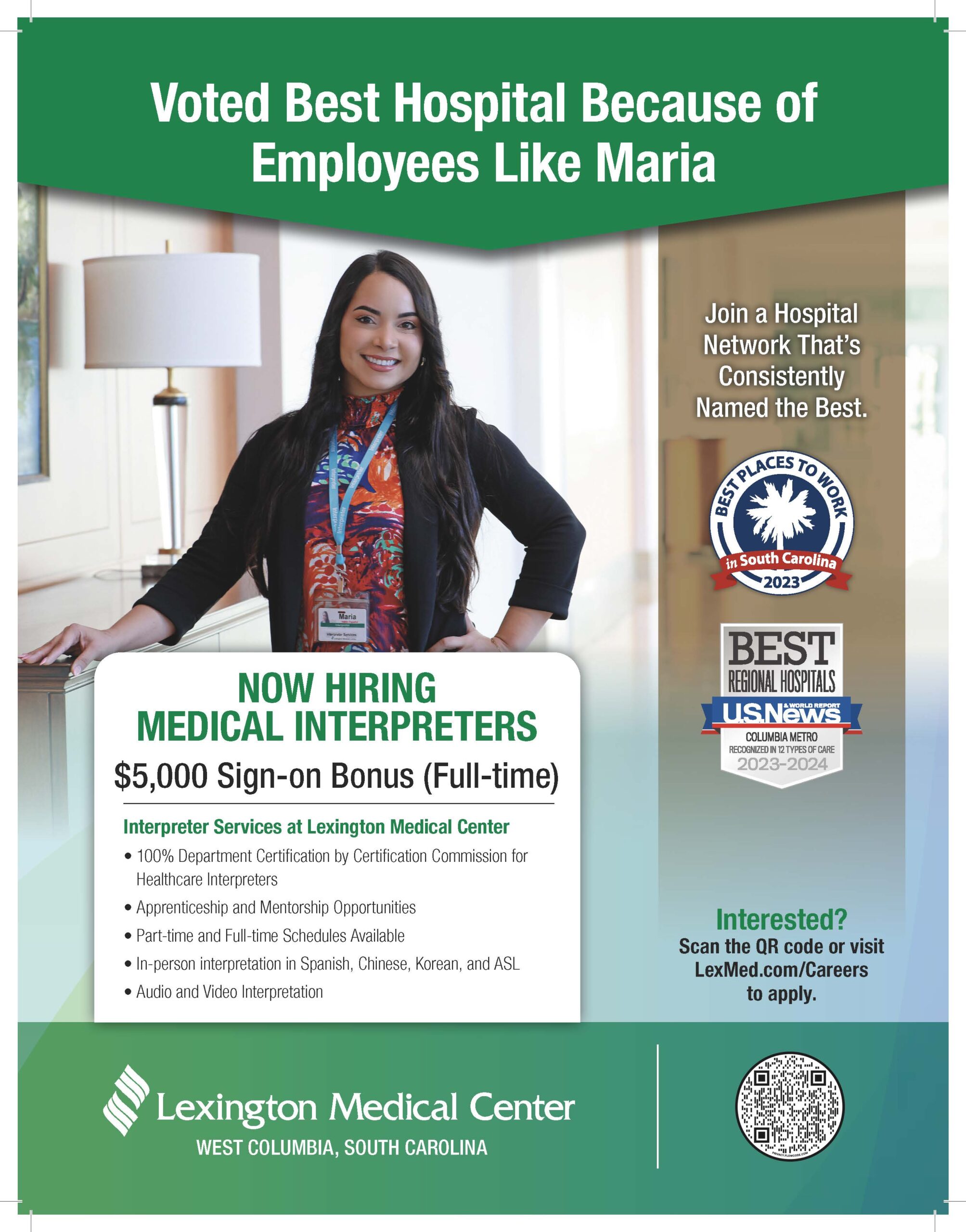 Consistently named best hospital, Lexington Medical Center dedicates itself to providing quality health services that meet the needs of its communities. Ranked #2 in the state and #1 in the Columbia metro area by U.S. News & World Report, Lexington Medical Center is the only hospital named one of the Best Places to Work in South Carolina. The 607-bed teaching hospital anchors a health care network that includes five community medical centers and employs more than 8,000 health care professionals.
Consistently named best hospital, Lexington Medical Center dedicates itself to providing quality health services that meet the needs of its communities. Ranked #2 in the state and #1 in the Columbia metro area by U.S. News & World Report, Lexington Medical Center is the only hospital named one of the Best Places to Work in South Carolina. The 607-bed teaching hospital anchors a health care network that includes five community medical centers and employs more than 8,000 health care professionals.
Tara Frazier – trfrazier@lexhealth.org
(803) 936-7012
Emerald Level Champion
MasterWord provides vital access to remote and in-person interpretation, translation, and localization services to companies, government agencies, hospitals, courts, and schools in 250+ languages. Now one of the largest language services companies in North America, MasterWord has stayed true to our mission of Connecting People Across Language and Culture® by doing business with heart, innovation, excellence, and integrity. Our team of language professionals work hard and have fun doing it!
Frankie Estrada – festrada@masterword.com
(832) 867-3293
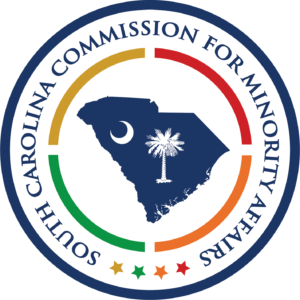
Our Vision All ethnic minority citizens of the State of South Carolina will be treated equitably and achieve economic prosperity through socio-cultural awareness, collaboration, policy change, and research.
Our Mission To be a catalyst that identifies and examines emerging issues and trends by providing constructive solutions and approaches to support the policy and socio-economic development of ethnic minority communities through: Community engagement and awareness; State recognition of Native Americans; Collecting, diagnosing and analyzing collaborative data; Acting as a liaison bridging the gap between communities, government agencies and other organizations and; Influencing public policy and state services.
Alex Tovar – atovar@cma.sc.gov
(803) 563-1630
CATI GOLD CHAPTER SPONSORS
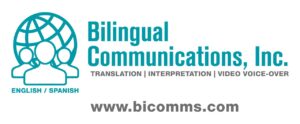
Bilingual Communications, Inc. was founded in 1991. Our team of professionals provides English & Spanish
translation, interpretation, and video voice-over services.
Services Provided: English & Spanish translation, interpretation, and video voice-over services
(919) 271-8172

The Department of Languages and Culture Studies at UNC Charlotte is a dynamic, research-intensive department with a commitment to balancing curricular tradition and innovation. Translation and interpreting courses provide students the opportunity to learn about the latest technologies, practice on advanced post-editing and translation project-management skills. The Department of Languages and Culture Studies offers the following graduate programs:
- MA in Spanish with a Concentration in Translation and Interpreting Studies
- Graduate Certificate in Translating (French, German, Japanese, Russian and Spanish)
- Graduate Certificate in Translation and Interpreting Studies
Programs | Department of Languages and Culture Studies | UNC Charlotte
(704) 687-8754

We are a nationwide provider of language services with nearly 30 years of experience, in the medical, legal & technical fields.
Monica Bew
E-Mail – monica.bew@nilservices.com
Website- http://www.nilservices.com/
1-877-567-8449
CATI BRONZE CHAPTER SPONSOR

VEQTA Translations is a Language Service Provider with representation in Malaysia, Bangkok and Singapore
that provides turn-key solutions for translation, dubbing and localization projects for virtually any platform.
The company specializes in Asian language translation and can also provide localization solutions in most
major commercial languages. We currently have 400 full time translators working for us throughout Asia and
3500 translators and editors worldwide.
Become a Conference Champion
Conference Champions support CATI’s educational efforts and we offer you advertising opportunities. We have three levels of Champions: Diamond, Sapphire, and Emerald We also offer a specialized level as a Pearl member.
Full details can be found on our website: https://catiweb.org/cati-2024-conference/
Be a Conference Exhibitor
Exhibitors will have a table in the main area to share your information with all of the conference attendees. Exhibitor Table $300 (Chapter Sponsors are free). Two person team $400. Exhibitors also get to attend sessions, join us for meals & snacks and earn CEU’s.
Session Abstracts:
Keynote:
Irreplaceable Interpreters: How Stepping Up and Standing Out Can Help Us Stay Relevant in our Fast-Changing Industry by Andrea R. Henry We are at a crossroads in the language services industry. Artificial Intelligence (AI) is quickly becoming interwoven into the work of interpreters. If AI has the potential to negatively impact our job opportunities, then it may be time for us to take this bull by the horns. It starts with us. The time is now for stepping up our game and standing out. The presenter will argue that coming out of the shadows is key to raising our status and increasing the value others place on us. It could also save some jobs. Secondly, the presenter will share strategies that can be employed by interpreters, trainers, administrators, and agency owners. We can all use these strategies to advocate for the relevance of interpreters. She will share techniques for showing our value and how to teach others to appreciate the mental gymnastics occurring inside our amazing brains during the interpreted encounter. We know how demanding this job can be. We know that it requires far more cognitive skills than just speaking two languages. But others do not. In fact, most people assume this job requires us to just be bilingual and nice. But we can change that. We can help them understand our complex skill set. Finally, the presenter will argue that a national messaging campaign could help us move forward. If we learn how to articulate our skillset and the added value we bring to the table, there’s great potential to not only improve our status but also enhance our working conditions and pay. In the end, we might be a little less misunderstood and a lot more valued. And maybe, just maybe we can keep AI from invading too much of our workspace.
Learning Objectives:
1. Explore artificial intelligence in our industry and its potential impact on our work, both positive and negative
2. Debate the intersection of AI and the restrictive, “black box” model of interpreting versus the practitioner model of interpreting
3. Learn specific strategies and how to use them so that we can each play a part in elevating the status of our profession and increase our perceived value as human interpreters
4. Gain a deeper understanding and specific scripts to educate others in real time about the misunderstood skill set and undervalued cognitive skills that are required of healthcare and education interpreters
Concurrent Sessions: T = Translation, I = Interpretation, B = Business
SESSION 1
1A – “Inclusive and Non-binary Language, Pragmatic and Linguistic Tools for English-Spanish” by Dr. Javier García León- T & I
This webinar will present and review the current trends and debates on inclusive and non-binary language, with a focus on Spanish. From a critical sociolinguistics approach, the presentation will examine the different theoretical and linguistic approaches to this issue. The presentation will also provide some linguistic strategies to implement inclusive and non-binary language in English>Spanish translated or interpreting renderings, including the adoption of the e- in many discourses. This webinar is open to translators, interpreters, and language instructors in all languages and specialties, although the examples and data presented during the webinar will be mainly in Spanish as this is the language of study.
Learning Objectives:
1. Describe the current approaches and critiques to inclusive and non-binary language in Spanish.
2. Compare commonly used linguistic strategies in inclusive and non-binary language in Spanish.
3. Identify additional resources for the implementation of inclusive and non-binary language in
English-Spanish interpretation and translation assignments.
1B – The Process of Becoming an Immigration Interpreter by Maria Gaspar – I
The goal of this presentation is to help other colleagues understand what it takes to become an immigration court interpreter and the process involved in getting certified to interpret in the DOJ courts. It will also help others to understand what an LEP has to face while going through an immigration process and how to better help our communities.
Learning Objectives:
- Create cultural awareness
- Promote the preservation of the indigenous language
- Understand the difference between a dialect and a language
- Promote the interpreting and translation profession among school-age children
1C. Summarization in Spoken Healthcare Interpreting: Heresy or Strategy? By Catherine Wilson – I
For years, Summarization has been labeled heretical in the spoken healthcare interpreting world. However, when used appropriately in the right scenarios, it can be a great interpreting strategy. This presentaiont gives an overview of summarization, what the interpreting literature says about it, which specializations commonly utilize it as an interpreting strategy, and teaches interpreters to identify scenarios where summarization is appropriate and practice summarization strategies that maintain accuracy in healthcare interpreting encounters.
Learning Objectives:
- Define summarization and learn what interpreting literature says about it
- Learn which specializations utilize summarization and its benefits
- Identif scenarios where summarization is appropriate and practice summarization strategies that maintain accuracy
SESSION 2
2A. “Ethics and Market Forces: Trends Shaping the Profession” by John Arroyave – I & B
It has been nearly 20 years since the publication of the “Interpreter’s World Tour.” Commissioned by the National Council on Interpreting in Health Care (NCIHC), The Interpreter’s World Tour is CCC’s most widely downloaded research publication and was a key contributor in the creation of NCIHC’s National Standards of Practice for Interpreters in Health Care. As an environmental scan, it included 145 documents in 11 languages from 25 countries, and analyzed standards of practice from around the world.
The Interpreter’s World Tour served as a unifying document that helped to standardize and harmonize the interpreting profession. It has aided in the training of interpreters for close to twenty years and was a catalyst in dramatically professionalizing healthcare interpreting.
According to some estimates, since 2005 the interpreting market itself has nearly tripled in size. The demand for qualified interpreters continues to expand. So it was fitting that in 2022, as a key component of The Remote Interpreter (TRI), CCC conducted a comprehensive update on the Interpreter’s World Tour. It is Chapter 6 of TRI. At nearly twice the length of the original, the update reflects the dramatic growth, evolution and continued maturing of the interpreting profession.
As part of our Learning Objectives, we would like to explore some questions this raises about the Profession:
- To that end, what can we learn from the difference between the two studies?
- What do these differences tell us about how the interpreting profession has changed across the last twenty years?
- And what does this evolution tell us about how the how interpreting profession is likely to evolve in the future?
2B. “Traducir lo Intraducible, O Cómo Hacer Que Shakesspeare “Suene” En Español” By Dr. Santi go
Garcia Castañón – T in Spanish
En un artículo seminal publicado hace casi cuatro décadas, Lawrence Venuti destaca el hecho de que el traductor debe permanecer invisible. Ahora bien, toda traducción es el resultado de una mediación, por lo que este objetivo de la invisibilidad casi nunca puede lograse del todo. Pero aun aceptando que la invisibilidad del traductor pudiera conseguirse en muchos ámbitos de la traducción, en mi opinión no es en modo alguno aplicable en el caso de la traducción poética, donde la presencia del traductor es evidente e inevitable. Y más aún, si se trata de poesía clásica, sometida a las rígidas normas de la métrica. Un traductor reproduce y genera significado mediante la dualidad de fidelidad y transformación, y por mucho que la fidelidad sea un “aspirational goal”, la transformación que se lleva a cabo es evidencia de la intervención del traductor.
En esta presentación describiré los retos de traducir la obra de Shakespeare y la de otros poetas ingleses clásicos, con rima y con una rígida estructura formal, algo que puede intimidar a cualquier traductor.
Igualmente aportaré algunas soluciones sobre cómo vencer este difícil reto.
Learning Objectives:
- Understand English of the Elizabethan period
- Overcome the fear of translating poetry
- Develop linguistic mechanisms to synthesize meaning
2C. An Embarrassing Visit to the Gastroenterologist: A Hands-On Role Play for Interpreter Practice by
Melisa Soto-Escobar – I
The Gastroenterologist welcomes the patient, who is suffering from intermittent constipation and diarrhea. In the course of the conversation, the doctor discovers that the patient probably has GERD (Gastroesophageal Reflux Disease). The doctor prescribes medication and orders a stool exam. The patient does not wish to comply with the doctor’s requests and isn’t shy about saying so.
THIS ROLE-PLAY IS RATED ADVANCED 1 AS TO DIFFICULTY AND HAS SOME SPECIAL CHALLENGES FOR THE INTERPRETER. HANDOUTS WILL BE PRESENTED TO THE ATTENDEES.
Learning Objectives:
- Feel familiar with basic Medical Terminology of Gastroenterology as it relates to GERD (Gastroesophageal Reflux Disease).
- More prepared to manage the Flow of Communication when the message is too long, too rapid or when there are interruptions.
- Become more spontaneous in requesting “Clarifications”.
- Become more confident generally at Gastroenterology appointments.
SESSION 3
3A. Strategic Interpreting: Techniques and Scripts for Advanced Negotiations and Collaboration During the Interpreted Encounter (Part 1) by Andrea R. Henry – I
Interpreters who employ advanced practice strategies in the encounter, instead of purely “message in/message out,” can further enhance the interaction and improve clinical outcomes. The presenter will review ethical parameters and foundational principles which support advanced decision-making for healthcare and educational interpreters. In part I, the presenter will share seven techniques for interpreters to use during the encounter and for managers and leaders to support. She will highlight the use of scripts to improve others’ appreciation of our practice decisions; unique visual aids that enhance communication for all parties, as well as improve interpreter practice; and a unique approach to navigating technical terms, concepts, and acronyms. The presenter will argue that interpreters who employ these techniques help raise our status, as well as achieve better communication, trust, and satisfaction in the encounter. The presenter will ultimately propose that interpreters who possess emotional intelligence (EQ) and soft skills make more effective decisions and further elevate the value others place on us.
Learning objectives:
- Learn specific scripts to educate all parties of your decision-making process and the value you bring to the encounter
- Explore specific visual aids (that benefit all parties) to facilitate communication and enhance the outcome
- Gain innovative solutions for navigating sophisticated terms, concepts, and acronyms in the encounter
- Enhance your value by mastering negotiation and collaborative skills in the setting of dialogue interpreting
3B. What Employers Are Looking For: A Nationwide Analysis of Job Description for Translators and Interpreters in Educational Settings by Dr. Mónica Rodríguez-Castro and Gabriela Siebach – T & I
Unlike in other countries, in the United States the recognition, standardization, and professionalization of interpreting and/or translation has been primarily propelled by legislation, which has consequently caused the profession to evolve differently in each sector or field. Regulation and guidance about communication and language access in educational settings is very limited and does not clearly outline the duties, tasks, and responsibilities of interpreters and/or translators. Since 2020, the AAITE Job Task Analysis (JTA) Committee has led a nationwide analysis of the current knowledge, skills, duties, tasks, responsibilities, and working conditions of today’s interpreters and translators in K–12 education. The first task of the JTA Committee was to find and analyze job descriptions and open job postings for interpreters and translators published by a wide range of school districts throughout the nation. The job descriptions and subsequent report informed the second task, a survey that was circulated from March to May of 2023. This presentation will provide highlights from over 300 job descriptions analyzed and the preliminary results of the survey. This project contributes to a broader initiative in support of advancing the professionalization and recognition of interpreting and translation in education.
Learning objectives:
- Identify the legislation and guidance supporting language access in K–12 educational settings
- Analyze how employer expectations vary throughout the country based on data from over 300 analyzed job descriptions for interpreters and translators in K–12 educational settings
- Examine whether job description requirements are representative of actual job tasks, duties and responsibilities for interpreters and translators in K–12 settings
- Describe the professional profile of translation and interpreting professionals that employers are looking for in today’s work settings
2A. My New AI Assistant: Current AI Trends in Translation by Laura Viale – T, I, & B
It is widely acknowledged that translators play a significant part in breaking through language barriers while facilitating trustworthy and effective communications across cultures. In response to the increasing volume in translation projects, professionals are resorting to multiple tools and resources to enhance their productivity and accuracy to meet tight deadlines. AI powered language models and generative machine translation have recently emerged and are playing a key role in their efforts to remain competitive.
AI language models represent additional tools that offer professionals enriched research capabilities to empower them. Translators can rely on these models to define topic-related terms, provide explanations on specific areas of specialization and offer examples. This enables them to conduct research and ensure that the translated rendering aligns with its adequate context. Tools like ChatGPT, Poe, DeepL, Google Translate, among others, have proven to assist professionals through the translating process with (1) language support, (2) contextual assistance and (3) terminology management. Translators can leverage these tools to ensure textual and terminological consistency while preserving accuracy and precision. AI language models act as allies or “tutors” by offering editing or writing support and aid translators to overcome productivity challenges in a rapidly evolving linguistic landscape.
This presentation will explore how AI language models assist translators by maintaining consistency and accuracy in their translated rendering. It will also provide a practical approach on how to leverage these tools. Through an examination of the advantages and limitations of these technologies, this presentation sheds light on how translators can harness their power to excel in their profession and meet the demands of rapidly evolving industry.
Key words: disruptive technologies, generative AI models, machine translation.
Learning Objectives:
- Understand the role of AI language models in the translation process.
- Explore how AI tools can enhance translators” productivity.
- Gain insights into the challenges and limitations of AI tools.
ABOUT THE SPEAKERS
(in alphabetical order by first name)
Speaker Bio’s in alphabetical order by first name:
Andrea Henry, CHI-Spanish: Andrea has enjoyed working professionally in the field of healthcare interpreting for over 25 years. Most of those years have been in face-to-face interpreting of dialogue in both adult and children’s healthcare settings. Interpreting on the frontlines is her biggest joy. Additionally, Andrea has learned a great deal from many roles in this field having worked as a freelance interpreter, full-time OPI interpreter, interpreter coordinator for two healthcare organizations, interpreter trainer, full-time F2F interpreter in a level 1 trauma center, and interpreter researcher. She has extensive experience in written translation (e.g., English > Spanish home care instructions), public speaking, and mentoring novice interpreters. Andrea’s areas of interest and expertise include specialization (e.g., pediatric cancer, pediatric heart defects, etc.), outside-the-box methods for navigating technical speech and sociolinguistic bumps, and value-added scripting for improved encounter interaction. Andrea is dedicated to moving our field forward by sharing strategies that improve communication and the patient’s clinical outcome, as well as raise our perceived value. She is strongly invested in keeping interpreters on the frontlines by raising awareness of our skill set, improving working conditions, and addressing the issue of fair pay. Andrea is the principal investigator on grant-funded research on development and validation of a tool that measures complexity and mental fatigue in the healthcare encounter. Finally, Andrea was named Commissioner for the CCHI in 2021 and is an active member of NCIHC.
Catherine Wilson: Catherine received her Master of Arts in Interpreting and Translation Studies from Wake Forest University in 2017. A Certified Healthcare Interpreter (CHI), she has seven cumulative years of Spanish interpreting and translation experience from Wake Baptist, UNC Health and Atrium Health. She served as Secretary to the CATI board from 2018-2020 and has presented at several workshops and conferences on Informed Consents: A Matter of Life & Death as well as Disjointed: Interpreting for Patients with Traumatic Brain Injuries, Strokes & Tumors. She currently works as a professional translator for Bank of America and a simultaneous interpreter for Into Languages Global.
Gabriela Siebach: Gabriela Siebach currently serves as Chair of the American Association of Interpreters and Translators in Education (AAITE) Job Task Analysis Committee. She is also the Director of Interpreting Services at Cesco Linguistic Services and Adjunct Professor at UMass – Amherst and has accumulated more than 15 years of professional experience in the language services industry. Gabriela holds a graduate degree in Spanish translation and interpretation from the world-renowned Middlebury Institute of International Studies at Monterey. Gabriela also sits on the American Translators Association Government Division Leadership Council and Interpretation Profession Advisory Committee, and volunteers on several initiatives of the National Council on Interpreting in Health Care Policy, Education & Research Committee. She is a member of the Carolina Association of Translators and Interpreters, National Language Service Corps, National Association of Judiciary Interpreters and Translators, and ASTM.
Javier García León: Javier García León (Ph.D. University of Ottawa) is an Assistant Professor of Spanish Linguistics at the University of North Carolina at Charlotte and currently serving as Associate Editor for the Spanish Journal of Applied Linguistics. He teaches specialized courses on Spanish sociolinguistics. His primary research interests include critical discourse analysis, sociolinguistics, language policies, and LGBTQI media representation. His articles have appeared in Latin American Research Review, Language and Sexuality, Hispania, Boletín de Filología among other scholarly journals. His monograph explores the representation of transgender people in Colombian and Venezuelan press and cinema (2021).
John Arroyave: John Arroyave is a professional Spanish<>English interpreter and a passionate advocate for language access and professional interpreting. John has trained several hundred interpreters across hundreds of language combinations and has worked with countless health systems, behavioral health systems, state hospitals, school systems, court systems, school districts, non-profits and government agencies in his 20+ year career. John has been informally interpreting since he was a child and is a firm believer in the far-reaching benefits of language access for all members of a community. John has seen, and experienced first-hand, the profoundly impactful, life-changing, and often life-saving, benefits of language access and professional interpreting. In his role as Director of CCC, John works to instill a profound understanding of the need for a standards and ethics driven approach to interpreting centered on a deep understanding of the central principle of interpreting: communicative autonomy.
Laura Viale: Laura Viale is an M.A. Fellow in Spanish at UNC Charlotte, teaching Spanish and Gen Ed courses on Global Literature and Culture. She got her B.A. in Translation and Interpretation at the Universidad del Museo Social Argentino, Argentina, where she worked as a freelance translator for many clients. Laura also holds an M.A. in Hispanic Linguistics from the University of Arizona, where she worked as a Spanish language instructor and coordinator. Laura was also part of the Community Engagement program at the Tucson Museum of Art, where she was a cultural advisor in charge of translating the material for the exhibits. She has over 12 years of experience in translation and localization. She has recently worked as a freelance language consultant on data annotation, curation, quality assurance, and analysis for Artificial Intelligence projects (AI). Her interests are intercultural competence, technology and AI, translation as a fifth skill, language analysis, and corpus linguistics.
Maria Tomas Gaspar: Being an immigrant from Guatemala, I was blessed and privileged enough to have been born in a place where one of the indigenous languages are spoken because I was gifted to learn and use it during my childhood.
Chuj, one of the many Indigenous Mayan languages from Guatemala is one of the language pairs that I am very proud to be interpreting in.
Around the age of 7 I left my hometown for the first time to be sent to school in the city not being able to understand or speak Spanish with the first couple of year being the hardest.
Going through the process of learning and adapting to another culture and language, was not easy however it has helped me learn and understand the struggles that many immigrants are facing coming to the USA not being able to speak or understand another language and culture.
Being an interpreter has become my passion because it gives me the opportunity to serve and help others and make their lives somewhat easier with communication especially in the Chuj community by breaking the barriers of languages, which are both fulfilling and rewarding.
Melisa Soto-Escobar, CHI: Melisa Soto-Escobar, CHI, has been interpreting for over 20 years in the fields of: Healthcare, Educational, Legal, Community, Business etc. As a simultaneous and consecutive interpreter, Melisa has a well-rounded background and has even served as a consultant for TV Broadcasts and a contributor to the NCIHC ListServ. Melisa has given presentations too numerous to mention, both in-person, and in Webinars or Workshops. She has contributed to the rich educational opportunities available through Verbatim Language Services, Inc in Waynesville, NC, serving as one of their principal Instructors.
Mónica Rodríguez-Castro: Mónica Rodríguez-Castro (Ph.D. Kent State University) is an Associate Professor of Translation Studies and Spanish at the University of North Carolina at Charlotte. She teaches specialized translation practice, computer-assisted-translation tools, and project management. Her primary research interests include empirical studies in translator satisfaction, translation pedagogy, and corpus linguistics. Her recent research has been in published in The Interpreter and Translator Trainer, Translation and Interpreting Studies and Translation Spaces. She is currently serving as Vice President of the Carolina Association of Translators and Interpreters (CATI).
Santiago García-Castañón: Santiago García-Castañón was born in Spain and holds a degree in English Philology from the Universidad de Oviedo (Spain) and a Master’s and Ph.D. in Spanish Literature from the University of Illinois (USA). He is currently Professor of Spanish Literature at Western Carolina University, where he also served as department head for seven years. He specializes in non-canonical literary texts of the Early Modern period and has produced several critical editions of previously unavailable texts, including the first world edition of Verdadera relación de la grandeza del Reino de China, a previously unpublished 16th-century chronicle. This edition is based on a long-lost manuscript dating back to 1575 which he discovered at Spain’s National Library, in Madrid.
Dr. García-Castañón is also a translator, a certified court interpreter and an award-winning poet and novelist with nineteen books to his credit. He has participated in various international poetry festivals and has given over 180 lectures and poetry recitals in more than fifteen countries in four continents. Most recently he has translated John Milton’s complete sonnets into Spanish verse.
